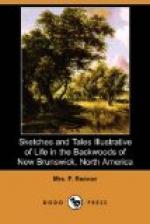the converts one by one joining him, and singly became
encircled in the shining waves: many of them were
aged and bowed with time, and now took up the cross
in their declining days; and others of the young and
fair, who sought their creator in youth. It was
wondrous now to think of this once lonely stream of
the western world, the Indian’s own Ounagandy.
A few years since no voice had broke on its solitude
save the red man’s war-whoop, or his shrieking
death song—no form been shadowed on its
depths but the wild bird’s wing, or the savage
speeding on the blood chase. Now its living pictures
told the holy records of the blessed east, and its
waters typed the healing stream of Jordan. After
some more singing and prayers offered for the newly-baptized,
the ceremony was finished. ’Tis strange
that on these dipping occasions no cold is caught
by the converts. I suppose the excitement of
the mind sustains the body; but persons are often baptised
in winter, in an opening made through the ice for the
purpose, and walk with their garments frozen around
them without inconvenience, seeming to prove the efficacy
of hydropathy, by declaring how happy and comfortable
they feel. We, at the conclusion of the prayers,
left the place, and proceeded homewards in a canoe;
this is a mode of locomotion much liked by the river
settlers, but to a stranger anything but agreeable.
They glide along the waters swift and smooth, but
a slight cause upsets them, and as perhaps you are
not exactly certain about being born to be hanged,
you must sit perfectly still—you are warned
to do this, but if you are the least nervous, you
will hardly dare to breathe, much less move, and this,
in a journey of any length, is not so pleasant.
This feeling, however, custom soon dispels; and when
one sees little fairy girls paddling themselves and
a cargo of brothers and sisters to school, or women
with babies taking their wool to the carding mill,
they feel ashamed, and learn to keep the true balance.
Our light skiff, or bark rather, as it might be truely
styled, being a veritable Indian canoe, made of birch
bark most cunningly put together, these being so light
as to float in shallow water, and to be easily removed,
are for this reason preferred by the Indians to more
solid materials, who carry them on their backs from
stream to stream during their peregrinations through
the country, soon bore us over the diamond water,
whose mirrored surface we scarcely stirred, to the
landing place, whose marshy precincts were now all
gemmed with the golden and purple flowers of the sweet
flag or calamus; and as the sun was yet high in the
glorious blue, we resolved to spend the remainder of
the day with a family living near; feeling, in this
land of New Brunswick, no qualms about a sudden visitation,
knowing that a people so proverbial for being “wide
awake” can never be taken unawares. Their
dwelling, a large frame building painted most gaily
in the bright warm hues the old Dutch fancies of the




